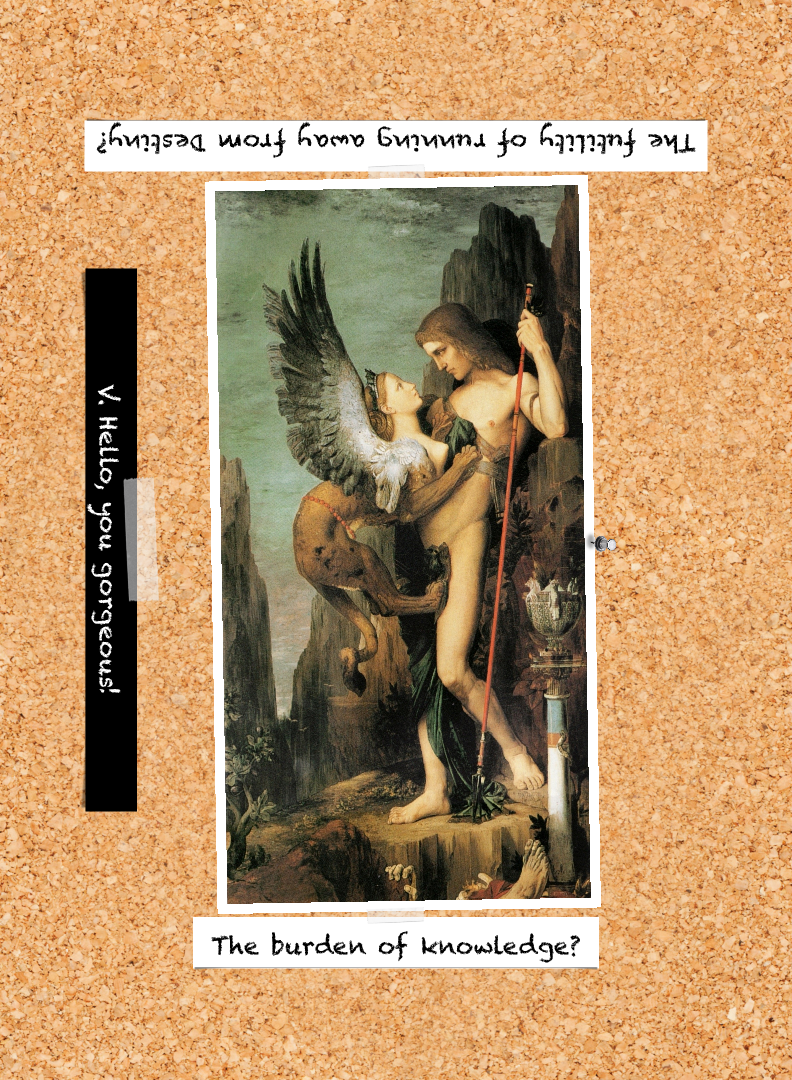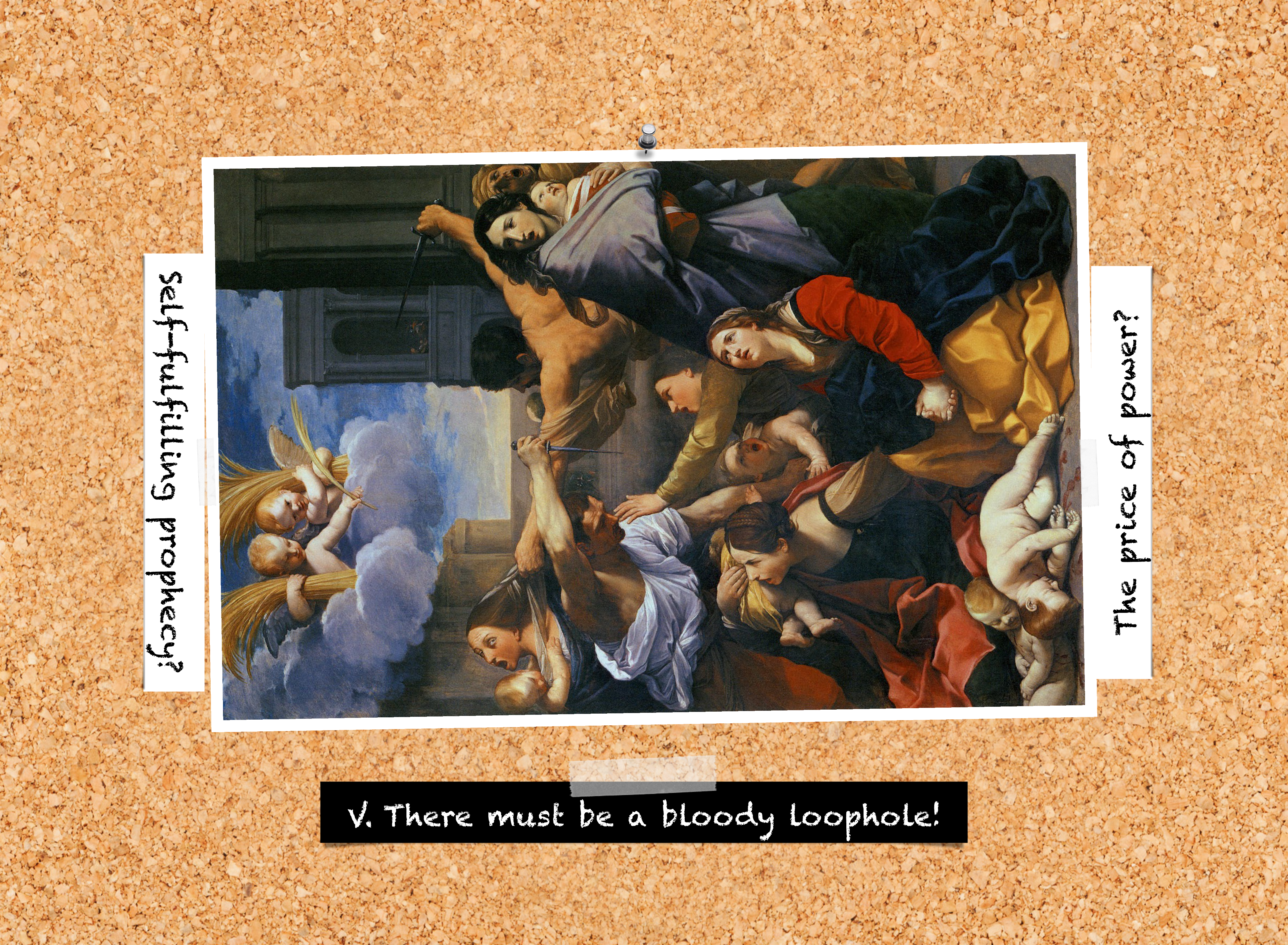
This is an extract from the Plotonomicon.
Note that we have just changed the picture from

The old picture (The Slaughter of the Innocents) one was considered too violent – while both are museum pieces, the first one depicts mass murder of children, and was thus discarded as not-safe-for-children’s-hands.
This new version gets rid of almost all violence, and offers much more symbolism, hence much more freedom of improv.
Interpretations
Default interpretations:
- The futility of running away from Destiny?
- The burden of knowledge?
This picture depicts Oedipus and the Sphinx of Thebes facing – or perhaps embracing – each other. In Greek Mythology, Oedipus is the son of Queen Jocasta and King Laius of Thebes. Before Oedipus' birth, it was prophecized that he would murder his father and marry his own mother. To avoid the fulfilling of this prophecy, Oedipus’ parents had him wounded at birth and abandoned to die in the wilderness. Of course, Oedipus survived and was adopted by loving parents – the Queen and King of Corinth. When, as a young adult, Oedipus eventually learnt of the prophecy, not knowing that he had been adopted, he fled his home to, once again, forestall the prophecy. Oedipus ended up meeting and killing King Laius, his real father, defeating the Sphinx of Thebes, and, as savior of Thebes, marrying the recently widowed Queen Jocasta. This unknowingly incestuous marriage cursed the city of Thebes, but it is only years later that Queen Jocasta and King Oedipus realized, after a series of coincidences and revelations, that they were mother and son. In shame, Jocasta killed herself, and Oedipus blinded himself, walking the roads as a blind beggar. Just to make sure that this story couldn’t have any kind of happy ending, their children continued the curse - life was hard in Ancient Greek Myths.
As for the Sphinx, she was a guardian of sorts, who choked and ate whoever could not answer her riddles, until she met a man who could, at which point she killed herself. In a later version of the story, she actually gave Oedipus the answer to the riddle, because that was her only way out this role of evil monster.
The image
The fight between a hero and a monster, or a dance of seduction, or two arrogant figures, or a woman, more forward than what society expects, and a younger man, surprised. Also, a desolate landscape, the only entrance to a mysterious city. Also, a guardian of secrets, willing to shed her charge. Also, a blundering teenager, surprised by a question or a secret whispered and about to be trapped into power. Also, the clinging hand of a victim not fully dead yet.
The burden of knowledge
Information, but an information that comes with a cost. Maybe the cost is upfront and visible, and the heroes will have to meet it to get the information. More likely, this information comes with a responsibility that the characters should not have wanted, perhaps in the form of a choice to make, or a long-ignored debt to own. Perhaps it is time for a character to learn of a bastard they have sired, or a child thought dead, or a lover or a friend or a mentor in hardship. Perhaps it is time for the heroes to make a choice where no option is acceptable.
The futility of running away from Destiny
If something was hunting down the heroes, or perhaps their antagonists, that something has arrived, or at least a good reason to believe that it cannot be escaped. Perhaps a countdown had started for some doomsday clock? Doomsday has arrived while the characters were looking away. Maybe a prophecy was under way, or a paradox? In either case, it is time to tie the knot. Or maybe it is something less scary that cannot be escaped anymore, something like love, or a conversation that needs to happen now, even in the middle of a dungeon. Or maybe it is time for a character to realize their role in the story and perhaps even to accept it – a hero may be born, or a villain.
Example: Going beyond the enemy lines
World War 2 in Europe. The sarge and his men have been tasked with a secret mission. They have spent two days half-lost beyond the enemy lines, and have finally just reached the hill behind Château Maniais. They only have a few hours before the Obersturmführer escapes towards Berlin. The sarge looks at the Château from his goggles. What does he see?
- Either side:
- The entire surroundings of Château Maniais have been turned into fortifications. Sandbags and barbwires everywhere, guard towards and machine guns. The only path leads towards the entrance and it is covered by Panzers. It’s going to be a tough job.
- The landscape is desolate, but only one of the windows is alight. At the window, two shapes seem to be dancing. One of them is uniformed, clearly the Obersturmführer. The other one is a womanm, probably his mistress.
- The burden of knowledge:
- The Obersturmführer’s retinue is getting ready to leave, that much is obvious – they are currently cleaning house. Which, among other things, means that they are taking a bunch of civilians – women, all of them – to the trench behind the castle, to be executed. The heroes have a chance to save them, if they act now, but this might come at the cost of the mission. Or the sarge can decide to stay mute, to spare the rest of the team from the responsibility of letting these innocents be murdered.
- The Obersturmführer is getting ready to leave alright, and he’s not leaving empty-handed. The sarge witnesses two trucks being loaded with paintings, gold bars, jewels. Now, some squad members could decide to go for the gold after – or instead of – their mission. This could be desertion. Or the sarge might decide not to tell them.
- The futility of running away from Destiny:
- The sarge takes one second to focus, then drops the goggles. The Obersturmführer is right here, not twenty paces from the squad, relieving himself in front of a tree, or perhaps smoking a cigarette. Destiny has come for him.
- It was only a matter of time before the squad was spotted. Well, while the sarge was spotting, a sentry noticed something in the bushes. A patrol is dispatched to the squad’s position, right now.
Example: The shifting maze
A group of random strangers has awakened in a deadly shifting maze, in which they must band together to survive. Or not. Why were they put in the labyrinth?
- Either side:
- It’s a social experiment, pure and simple.
- It’s a rite of passage. If they manage to make it through, well, some secret will be revealed.
- The burden of knowledge:
- One of the strangers knows more than he lets on. He’s somehow responsible for everybody being here, perhaps because he built the maze, or perhaps because he’s the target, and everybody else was just caught with him.
- The maze is an interrogation device. This is not the first time the strangers awake in the maze. They have died already, and died again, and been cloned or resurrected. Each time, the maze rearranges itself, trying to get the strangers to talk and share. This will continue until one of the strangers finally reveals their secret.
- The futility or running away from Destiny:
- Everybody is sent to the maze, at least once on their lifetime. They don’t remember, because if they survive, their memory is erased.
- All these strangers are actually dead. This is some form of purgatory or hell.
Example: What does the Alchemist want?
The heroes need the expertise of an alchemist to identify the Stone of Power that they managed to trick away from the Lord of Wind Castle. As it turns out, there is only one alchemist of renoun in the region, and she serves in the Temple of the All-seeing. What does she want?
- Either side:
- The Alchemist is busy dealing with arcane knowledge. Maybe, if the heroes somehow find a way to help her in her investigation, she might make a little time to look at their babble.
- The Alchemist is in the middle of a lover’s quarel. Her companion, the professional hero, wants her tame and housebroken. She will have none of that, and she has enough arrogance to match that of her hero. For the moment, neither of the lover is willing to listen to the heroes, but there may be a way to try and get them to one-upman each other through piercing the enigma of the Stone.
- The burden of knowledge:
- The Alchemist is old, perhaps dying. She knows so many things, and has nobody to pass that knowledge. At this stage, the Alchemist wants – needs – an apprentice more than anything in this world. Everything else is secondary, including answering the questions of annoying heroes.
- Oh, that Alchemist? You mean, your mom? Well, I’m sure she’d like to hear about your latest adventures. Also, any grandchildren yet? No? Well, it just happens so that she knows someone your age, someone you should absolutely meet.
- The futility of running away from Destiny:
- The Stone of Power was created by the Alchemist, dozens of years ago. When she found out what the Stone could do, she did her best to destroy it or hide it. After all these years, the Stone is returning to its creator. The Alchemist only wants one thing: she wants to be far away from the Stone of Power!
- The Lord of Wind Castle is the former lover of the Alchemist. When they broke up, he stole the Stone. The Alchemist wants only one thing: the Stone itself.
